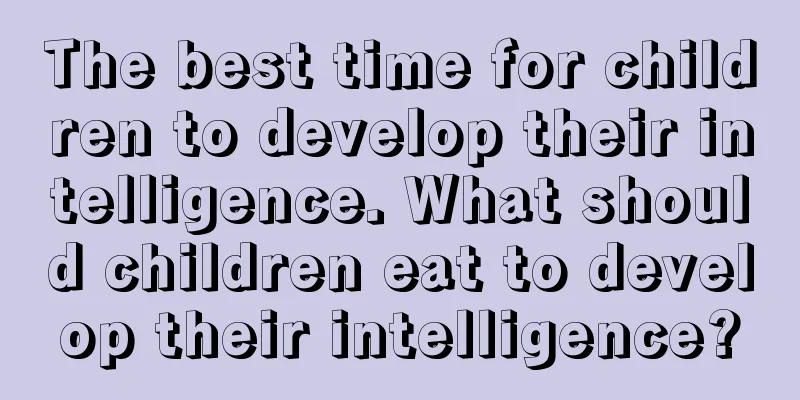The best time for children to develop their intelligence. What should children eat to develop their intelligence?

|
Although I am very busy at work every day, I still have to take care of my baby. My baby has been born for a long time and I don’t know whether his intelligence has developed. When is the best time for a child to develop his intelligence? What should he eat to supplement his intelligence? The best period for children's intellectual developmentCritical period 1: 0-1 years old, critical period for sound discrimination One week after birth, the baby can distinguish the voice of the mother who is feeding him, and after 4 weeks, he can distinguish different voices. Training methods: 1. When your baby wakes up and is in good spirits, read poetry to him. 2. Sing or play music for your baby often. 3. Talk to your baby often and teach him the names of people and objects, etc. 4. Take your baby outdoors often to listen to various sounds in the surrounding environment, such as dog barking, horns, doorbells, etc., and explain them to your baby one by one. 5. Imitate the sounds of animals and encourage your baby to imitate them. 6. Take advantage of games to let your baby distinguish sounds coming from different directions. 7. Let your baby interact more with people around him and feel the different sound characteristics and patterns. Key 2: 0-2 years old, critical period of motor development Training methods: 1. Starting from the first month of life, push your baby's feet with your hands to train him to crawl. 2. When the baby is 3 months old, hang some toys above his crib so that the baby can grab them with both hands to exercise his hand-eye coordination. 3. When the baby is 6-7 months old, create more opportunities for him to crawl. For example, let the baby lie on his stomach and put one or two toys in front of him to attract him to crawl forward and try to grab the toys to promote his motor development. Critical period 3: 1-3 years old, critical period for oral language development Training methods: 1. Guide the baby to pay attention to the voice and mouth shape of adults, and start to imitate the voice and actions of adults. At this time, the main thing is to train the baby's pronunciation, try to make his pronunciation accurate, and patiently correct some unclear language. 2. Guide the baby to associate speech with specific things and people. After repeated training, the baby will initially understand the meaning of language. For example, when the baby says "Dad" or "Mom", he will turn his head to Dad and Mom. 3. Use various things encountered in life to ask your baby questions, such as asking what color the leaves are while taking a walk, and ask your baby to answer, so as to improve his language expression ability. 4. Encourage your baby to talk more and patiently correct any incomplete or inaccurate expressions. Critical period 4: 2-4 years old, the critical period for the development of counting ability Training methods: 1. Take advantage of various opportunities in daily life to count to your baby often, such as when giving your baby candy or when going up and down stairs. 2. Use different objects, such as fingers, building blocks, etc., to count with your baby to increase your baby's sensory understanding of numbers. 3. Use vivid images to teach your baby to recognize numerical symbols, such as “1 looks like chopsticks, 2 looks like a duck, 3 looks like an ear”, etc. 4. Design some interesting games for your baby to play, such as asking your baby to find numbers from number cards. 5. Use specific examples to teach your baby addition and subtraction. You can use props such as apples and building blocks to demonstrate. 6. Provide enough physical materials and let your baby find the connection between numbers by himself. Critical period 5: 1-3 years old, the critical period for the development of musical ability Training methods: 1. Choose songs suitable for your baby, world famous songs, fairy tale music, etc., enjoy them with your baby, explain them at the same time, or ask your baby questions to stimulate his imagination. 2. Choose songs that are suitable for the baby's age and teach the baby to sing. Parents' Guidelines - Auxiliary work for developing intelligence. As a mother, you must actively understand the five periods of your baby's intellectual development, so that you can seize favorable opportunities to actively develop your baby's intelligence, make your baby smarter, become better, and let your baby's growth and development surpass most children. What should children eat to develop their intelligence?Eating foods rich in DHA is very helpful for children's intellectual development. Parents can give their babies more healthy complementary foods rich in DHA. You can use fish meat and dried fruits to make fish balls for children, or use scallop meat and shrimp with rice noodles to make complementary foods for children. Various deep-sea fish, shellfish, fish sauce, shrimp and crab are all effective sources of DHA for the human body. Eating more of this kind of food can help babies improve their brain intelligence. How do children develop intelligence?1. Look at sports performance A newborn baby will grab anything given to him. This is an instinctive reaction. The baby will not consciously grab things until he is three months old. Generally speaking, the baby can sit at six months old and stand at about one year old. If the baby sits and walks early, it means that the baby is well developed physically and has a higher intelligence. 2. Look at the language performance Language ability is controlled by the brain. Generally, babies start talking earlier, have a larger vocabulary than other children of the same age, and speak logically. Children with strong language ability have better brain development, which is also a manifestation of higher intelligence. 3. Look at the performance of critical thinking ability The way some babies speak may give people the impression of being "quick-talking" and "very smart", especially those children who like to argue. In fact, this is a manifestation of strong thinking ability and a symbol of higher intelligence. 4. Look at the performance of imagination Surveys show that children who love to play pranks are more creative and imaginative. This is because children playing pranks is not a free-for-all, they need to use their brains to "design" a whole plan, which is undoubtedly good for the development of their brains. 5. Look at the performance of research ability If you observe carefully, you will find that some babies love to play with small objects. They like to knock the small objects in their hands with their hands, or change hands to knock things. They will play with the small objects in their hands in various ways. They like to pick up small objects on the ground, and will also throw the toys in their hands hard to hear the sound. This shows that the baby is full of curiosity and exploration ability about many things, and always wants to do something to see if objects will change. This is also a manifestation of high intelligence. Games for children to develop their intelligenceGame 1: Kick your legs and stretch your waist How to play: Play soothing classical music, and mom and dad help the baby do body kinesthetic training: head and neck exercises (forward, back, left, right), arm exercises (forward, back, left, right, extension and circle), leg exercises (sit inward, abduction, flexion, extension, circle) and other exercises. While doing exercises for the baby, the parents look into the baby's eyes and recite the commands: one, two, three, four, two, two, three, four... Tip: This game is suitable for babies aged 0 to 1. The left side of the body is controlled by the right brain, and the right side is controlled by the left brain. Therefore, parents often help their babies to exercise, which can not only improve the flexibility and coordination of their body functions, but also cultivate their concept of space and promote the development of their right brain. Game 2: Dance How to play: With classical music playing in the background, mom and dad lead their baby to dance, clap or do various actions they like according to the rhythm of the music. This game is suitable for babies of any age. For babies who cannot walk yet, mothers can hold their babies and make dancing movements, or move their hands and feet to the rhythm. When hearing the sound of a musical instrument, babies over 2 years old can try to imitate the movements of playing the instrument. For example, when listening to violin music, imitate playing the violin; when listening to piano music, imitate the posture of pressing the piano keys with the left and right hands. You can also let your baby play freely and dance to the rhythm of the music. Tip: Classical music plays a great role in the development of the baby's right brain. With the accompaniment of beautiful music, the baby can make many beautiful and harmonious movements, which promotes right brain thinking and activates right brain functions. Game 3: What does it look like? How to play: Let the baby face a wall without too much visual stimulation. Mom or dad holds a picture card or building blocks in their hands and enters the baby's left eye from behind his left ear. Ask the baby: "What does this look like to you?" Let him use his rich imagination to answer the question. Note: Never ask "What is this?" Such questions can easily lead to a single answer and restrict children's imagination. Tips: This game is suitable for babies aged 1.5 to 3 years old. Imagination training can give more stimulation to the right brain cells. As long as your baby is not bored, you can play imaginative games with him often. For example, in sunny weather, parents can lie on the grass with their baby and observe the clouds in the sky, inspiring them to see clouds of different shapes as animals, fairies, angels, etc. Never underestimate your baby's curious exploration activities or silly "wild imaginations", because these are the budding stages of creative ability. Game 4: Find a friend How to play: Spread out a few letter cards and let your baby match two identical letter cards. If your baby confuses two different letters with similar appearances, parents can correct the mistake and point out their differences vividly. For example, when explaining the letter B, you can portray it as a baby's ear, and the letter P as a grandfather's cane. Tip: This matching game is suitable for babies around 1 and a half years old. As the baby grows older, gradually develop the matching game into a "classification game". For example: ask a baby around 2 years old to pair up pictures of the same animal in different poses; ask a baby aged 2 and a half to classify fruits, biscuits, etc. in pictures or real objects. Game 5: Throwing Paper Balls How to play: Take a basket, a vegetable basket or a laundry basket will do, then take some newspapers, wrap the newspapers into a ball, and make paper balls. Mom, dad and baby take turns throwing paper balls, each throwing 10, to see who throws the most balls into the basket. Tip: This sports game is suitable for babies over 2 years old. It requires babies to control the movements of their hands and make judgments about spatial distances, which are beneficial to the development of the baby's right brain. Game 6: Magical Paper Box How to play: Leave the used tissue boxes at home, put some toys, candies, fruits, etc. in it, let the baby touch it, ask him to say the name before taking it out, or give him instructions, please ask him to take out things according to the instructions. For older babies, you can give him negative instructions. For example: "Please take out the inedible things" or "Please take out the things that are not round" etc. To increase the fun, you can also use some reward methods. For example: if the baby takes the right candy, the candy will be given to the baby to eat, and if the baby takes the wrong candy, the mother will eat it. |
>>: Should baby eczema be treated with facial cream?
Recommend
Can I eat green oranges while breastfeeding? Can I eat oranges while breastfeeding?
Oranges are a popular fruit in autumn, and many p...
Can pregnant women practice yoga balls? What are the benefits of practicing yoga balls after pregnancy?
Yoga ball is a very popular exercise among female...
How can older women improve the quality of their eggs? What should older women pay attention to when preparing for pregnancy?
In today's society where women are becoming m...
What are the benefits of parent-child games?
Contemporary parents spend less and less time wit...
What should I do if my newborn has umbilical cord bleeding?
The navel of a baby is still very fragile soon af...
How to cure baby's red buttocks quickly? The real reason for the red buttocks
Many new parents are very worried when they find ...
Is it necessary to give water to breastfeeding? Is it necessary to give water to exclusive breastfeeding?
Many mothers are hesitant about whether breastfed...
What should I pay attention to for my newborn baby? What should I prepare for my newborn baby?
Facing the arrival of a new life, many new parent...
How many caps of Omo laundry detergent should be put in at one time? How many grams does one cap of Omo laundry detergent weigh?
No matter what brand of laundry detergent you use...
How to care for the newborn's belly button
After the baby is born, the nurse will tell the m...
Can babies who spit up milk take probiotics to treat it? Can babies who spit up milk apply hot compresses to their stomachs?
It is very common for babies to spit up milk. Man...
What should I do if my baby talks in his sleep?
Many babies talk in their sleep, most of which ar...
Low appearance may be due to loss of breast milk. Are breastfed babies better looking?
Do breastfed babies look better? Today, let's...
How many months is it appropriate to use a pacifier? What are the advantages and disadvantages of using a pacifier for babies?
Pacifiers are very common baby products. Pacifier...
Why does baby spit up milk from the nose? Why is baby spit up clear milk?
It is normal for babies to spit up milk. Many bab...









